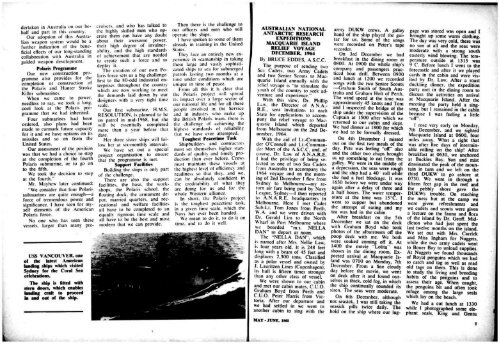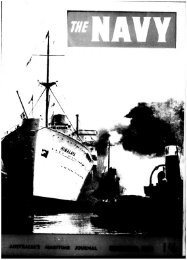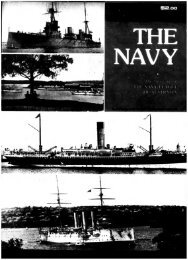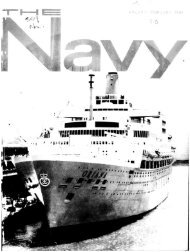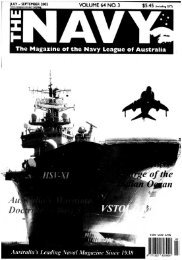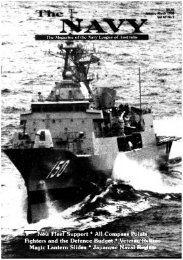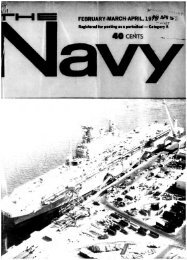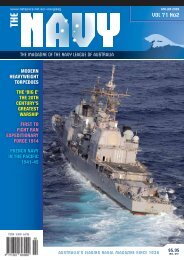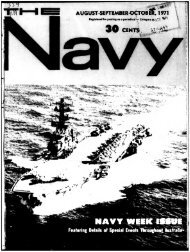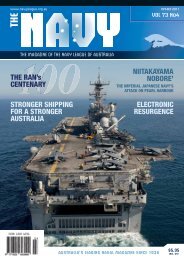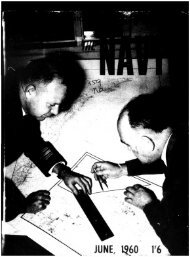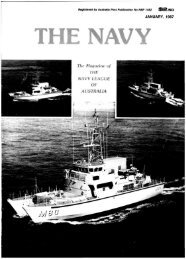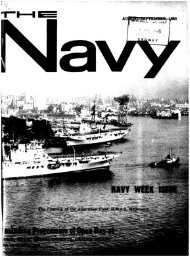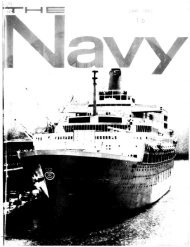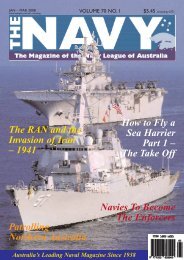Jan-Feb, Mar-Apr, May-Jun 1965 - Navy League of Australia
Jan-Feb, Mar-Apr, May-Jun 1965 - Navy League of Australia
Jan-Feb, Mar-Apr, May-Jun 1965 - Navy League of Australia
- No tags were found...
You also want an ePaper? Increase the reach of your titles
YUMPU automatically turns print PDFs into web optimized ePapers that Google loves.
_^dertakcn in <strong>Australia</strong> on our behalfand part in this country.Our adoption <strong>of</strong> this <strong>Australia</strong>nweapon system would be afurther indication <strong>of</strong> the beneficialeffects <strong>of</strong> our long-standingcollaboration with <strong>Australia</strong> inguided weapon development.Polaris ProgrammeOur new construction programmealso provides for thecompletion or construction <strong>of</strong>the Polaris and Hunter StrokeKiller submarines.When we came to power,needless to say. we took a long,cool look at the Polaris programmethat we had inherited.Four submarines had beenordered, also plans had beenmade to earmark future capacityfor it and we have options on itsmissiles and so on from theUnited States.Our assessment <strong>of</strong> the positionwas that we had a choice to stopat the completion <strong>of</strong> the fourthPolaris submarine, or to go onto the fifth.We took the decision to stopat the fourth."Mr. <strong>May</strong>hcw later continued:"We consider that four Polarissubmarines are quite enough—aforce <strong>of</strong> tremendous power andsignificance. I have seen for myselfelements <strong>of</strong> the AmericanPolaris force.USS VANCOUVER, one<strong>of</strong> the latest Americanlanding ships which visitedSydney for the Coral Seacelebrations.The ship is fitted withstern doors, which enableslanding craft to proceedin and out <strong>of</strong> the ship.No one who has seen thesevessels, larger than many precruisers.and who has talked tothe highly skilled men who operatethem can have any doubtabout their awesome power,their high degree <strong>of</strong> invulnerability,and the high standards<strong>of</strong> achievement that are neededto create such a force and todeploy it.The creation <strong>of</strong> our own Polarisforce sets us a big challenge:first to the 80-odd industrial enterprisesthroughout the countrywhich are now working to meetthe demands laid down by ourdesigners with a very tight timescale.Our first submarine, H.M.S.RESOLUTION, is planned to beon patrol in mid-1468. but shewill be essentially completedmore than a year before thatdate.Her three sister ships will followher at six-monthly intervals.We have set out a specialproject organisation to ensurethat the programme is met.Support FacilitiesBuilding the ships is only partor the challenge.There are also the supportfacilities, the base, the workshops,the Polaris school, thefloating dock, the armament depot,married quarters, and recreationaland welfare facilitiesall have to be completed to anequally rigorous time scale andall have to be the best and mostmodern that we can provide.Then there is the challenge toour <strong>of</strong>ficers and men who willoperate the ships.I have spoken to some <strong>of</strong> themalready in training in the UnitedSlates.They face an entirely new experiencein seamanship in takingthese large and vastly sophisticatedships to sea for submergedpatrols lasting two months at atime under conditions which areunique in time <strong>of</strong> peace.From all this it is clear thatthe Polaris project will spreadits impact over a large sector <strong>of</strong>our national life and for all thesepeople involved in the Serviceand in industry who make upthe British Polaris team, there isthe challenge <strong>of</strong> achieving thehighest standards <strong>of</strong> reliabilitythat we have ever attempted.Toughest Peacetime TaskShipbuilders and contractorsmust set themselves higher standards<strong>of</strong> quality and timely productionthan ever before. Crewsmust maintain these vessels atthe highest level <strong>of</strong> efficiency andreadiness so that they, and we,can be absolutely confident inthe creditability <strong>of</strong> what theyare doing for us and (or thewhole Western alliance.In short, the Polaris projectis the toughest peacetime task,in a given time scale, which the<strong>Navy</strong> has ever been handed.We mean to do it. to do it ontime, and to do it well.AUSTRALIAN NATIONALANTARCTIC RESEARCHEXPEDITIONSMACQUARIE ISLANDRELIEF VOYAGEDECEMBER, 1964By BRUCE EDDES, A.S.C.C.The purpose <strong>of</strong> sending twoSea Cadets, two Army Cadetsand two Senior Scouts to MacquarieIsland annually with therelief voyage is "to stimulate theyouth <strong>of</strong> the country to seek adventureand experience."With this view. Dr. PhillipLaw. the Director <strong>of</strong> A.N.A.-R.E., sent invitations to eachState for applications to accompanythe relief voyage to MacquarieIsland which departedfrom Melbourne on the 2nd Deocmber.1964.With the aid <strong>of</strong> Lt.-CommanderO'Connell and Lt.-CommanderMort <strong>of</strong> the A.S.C.C. and. <strong>of</strong>course. Dr. Law <strong>of</strong> A.N.A.R.E.1 had the privilege <strong>of</strong> being selectedas one <strong>of</strong> two Sea Cadetsfrom <strong>Australia</strong> to accompany the1964 voyage and on the morning<strong>of</strong> 2nd December I flew fromSydney to Melbourne—my returnair fare being paid by <strong>Navy</strong><strong>League</strong>, Sydney—I then reportedto A.N.A.R.E. headquarters inMelbourne. Here I met CadetSub-Lt. Tom Jones from Perth.W.A. and we were driven withDr. Gerald Lim to the NorthWharf in Port Melbourne wherewe boarded "m.s. NELLADAN" to depart at noon.The "NELLA DAN", whichis named after Mrs. Nellie Law,is four years old. It is 248 feetlong with a beam <strong>of</strong> 45 feet anddisplaces 2.300 tons. Classifiedas a polar vessel and owned byJ. Lauritzen Lines (Copenhagen),its hull is fifteen times strongerthan any other class <strong>of</strong> vessel.We were shown to our cabinand met our cabin mates. C.U.O.Graham Boyd from Perth andC.U.O. Peter Harris from Victoria.After our departure andwe had settled in we went toanother cabin to sing with theMAY - JUNE, IMSarmy DUKW crews. A galleyhand <strong>of</strong> the ship played the guitarfor us. Some <strong>of</strong> the songswere recorded on Peter's taperecorder.On 3rd December we hadbreakfast in the dining room at0800. At 0900 the whole ship'scompany and passengers practicedboat drill. Between 0930and lunch at 1200 we recordedsongs with the two Senior Scouts—Graham Smith <strong>of</strong> South <strong>Australia</strong>and Graham Holt <strong>of</strong> Perth.The wind speed at the time wasapproximately 45 knots and Tomand I inspected the bridge <strong>of</strong> theship under the supervision <strong>of</strong> theCaptain at 1500 after which wereturned to our cabin and slept.We had dinner at 1800 for whichwe had to be formally dressed.On 4th December I missedout on the first two meals <strong>of</strong> theday. Pete was feeling "<strong>of</strong>T' alsoand the other two chaps broughtus up something to eat from thegalley. We were in the middle <strong>of</strong>a depression, the seas were roughand the ship had a 40 roll whileshe had a fuel blockage. It was1630 before we were under wayagain after a delay <strong>of</strong> three anda half hours. The water temperatureat the time was 15 3 C. Iwent to supper but abandonedthe attempt <strong>of</strong> eating and mytea was had in the cabin.After breakfast on the 5thDecember we sat on the deckwith Graham Boyd who tookphotos <strong>of</strong> the albatrosses <strong>of</strong>f thepoop deck with me. We bothwere soaked coming <strong>of</strong>f it. At1400 the movie "Lolita" wasshown in the dining room. Expectedarrival at Macquarie Islandwas 0700 on Monday, 7thDecember. From a fine cloudyday before the movie, we wenton deck after it and found ourselvesin thick, cold fog, in whichthe ship continually sounded itssiren. The seas were moderate.On 6th December, althoughnot seasick, I was still taking theseasick pills twice daily. Thehold on the ship where our luggagewas stored was open and Ibrought up some warm clothing.The day was very cold, there wasno sun at all and the seas weremoderate with a strong southeasterly wind blowing. The temperatureoutside at 1315 was9 C. Before lunch I went to theforecastle and after it we playedcards in the cabin and were visitedby Dr. Law. After a roastduckling dinner, the expeditionparty met in the dining room todiscuss the activities on arrivalat Macquarie Island. After themeeting the party held a singsong,but I remained in the cabinbecause"<strong>of</strong>f.I was feeling a littleI rose very early on Monday,7th December, and we sightedMacquarie Island at 0600, fourmiles away. What a sight thatwas after five days <strong>of</strong> interminablerolling on the ship! Afterbreakfast at 0630. we anchoredat Buckles Bay. Sun and mistdominated the peak <strong>of</strong> the mountainin turn and we left on thethird DUKW to go ashore at0730. We went in through afifteen feet gap in the reef andthe pebbly shore gave theDUKWs trouble. On reachingthe mess hut at the camp wewere given refreshments andwe cadets and scouts were givena lecture on the fauna and flora<strong>of</strong> the island by Dr. Ge<strong>of</strong>f. Middletonwho had just spent thelast twelve months on the island.We set out with Mrs. Carrickand Miss Ingham for Nuggets,while the two army cadets wentto Bouer Bay to unload supplies.At Nuggets we found thousands<strong>of</strong> Royal penguins which we hadto catch and tag as well as readold tags on them. This is doneto study the living and breedinghabits <strong>of</strong> the penguins and toassess their age. When caught,the penguins bit and <strong>of</strong>ten tookrefuge among the large sealswhich lay on the beach.We had a cut lunch at 1330while I photographed some elephantseals. King and Gentu7


